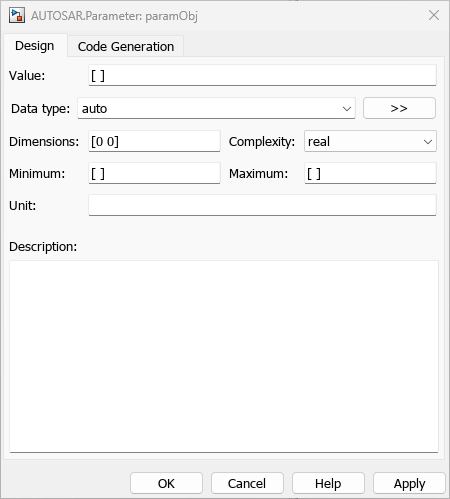AUTOSAR.Parameter
Specify value, data type, code generation options, other properties of parameter
For run-time calibration of AUTOSAR data, R2018b and R2019a introduced graphical mapping of model elements to AUTOSAR component parameters and variables. In the Code Mappings editor, you select a Simulink® model-workspace parameter or internal signal, state, or data store. You map the selected element to an AUTOSAR component parameter or variable and modify its AUTOSAR calibration attributes. If you currently model AUTOSAR parameters or variables by using AUTOSAR parameter or signal objects in the base workspace, consider migrating to the Code Mappings editor workflow. For more information, see Map AUTOSAR Elements for Code Generation.
Description
With this class, you can create workspace objects for modeling AUTOSAR calibration
parameters. You can create an AUTOSAR.Parameter object in the base
MATLAB® workspace.
This class extends the Simulink.Parameter class. With
parameter objects, you can specify the value of a parameter and other information about the
parameter, such as its purpose, its dimensions, or its minimum and maximum values. Some
Simulink products use this information, for example, to determine whether the parameter
is tunable (see Tune and Experiment with Block Parameter Values).
Simulink performs range checking of parameter values. The software alerts you when the
parameter object value lies outside a range that corresponds to its specified minimum and
maximum values and data type. For more information, see the Simulink.Parameter reference page.
Creation
Create an AUTOSAR.Parameter object by using the
AUTOSAR.Parameter function described below.
Description
paramObj = AUTOSAR.Parameter returns an
AUTOSAR.Parameter object with default property values.
Open the workspace object to view and modify its properties.

The Simulink.Parameter reference page describes
the parameter attributes in detail. The AUTOSAR.Parameter class extends
the Simulink.Parameter class with the following additional
selections for the Storage class attribute:
CalPrm— Calibration parameters belong to a calibration component, which can be accessed by multiple AUTOSAR software components. Selecting this storage class enables the custom attributes HeaderFile, ElementName, PortName, InterfacePath, CalibrationComponent, and ProviderPortName.HeaderFile allows you to optionally specify the name of the AUTOSAR software component header file that declares the calibration parameter.
ElementName, PortName, and InterfacePath allow you to associate the calibration parameter with a specific AUTOSAR element, AUTOSAR port, and AUTOSAR interface. Specify an element name, a port name, and an interface path. For example, element
K, portrCounter, and interfacerCounter/CalibrationComponents/counter_if.CalibrationComponent and ProviderPortName allow you to configure the calibration parameter to be exported in an AUTOSAR calibration component (
ParameterSwComponent). Calibration parameters exported in a calibration component can be accessed by multiple AUTOSAR software components, using the calibration component name and associated provider port name. CalibrationComponent specifies the qualified name of the calibration component to be exported, and ProviderPortName specifies the short name of the associated provider port. For example, calibration component/CalibrationComponents/counter_swc/counterand provider portpCounter.
InternalCalPrm— Internal calibration parameters are defined and accessed by only one AUTOSAR software component. Selecting this storage class enables the custom attributes HeaderFile and PerInstanceBehavior.HeaderFile allows you to optionally specify the name of the AUTOSAR software component header file that declares the calibration parameter.
PerInstanceBehavior allows you to specify
Parameter shared by all instances of the Software ComponentorEach instance of the Software Component has its own copy of the parameter.
SystemConstant— Allows you to control the storage of a system wide constant in generated code.
Version History
Introduced in R2013b
See Also
Simulink.Parameter | AUTOSAR.DualScaledParameter | AUTOSAR4.Parameter
Topics
- Create Tunable Calibration Parameter in the Generated Code (Embedded Coder)
- Model AUTOSAR Calibration Parameters and Lookup Tables
- Configure AUTOSAR Internal Calibration Parameters
- Configure AUTOSAR Calibration Component
- Variants for Runnable Implementations
- Configure Variants for AUTOSAR Runnable Implementations
- Configure AUTOSAR Data for Calibration and Measurement